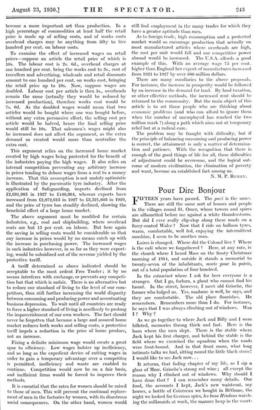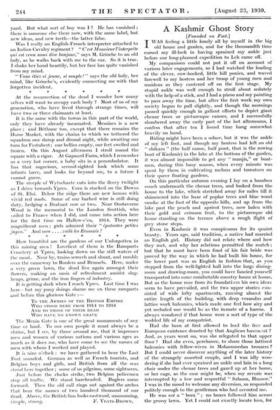Pour Dire Bonjour
FIFTEEN years have passed. The pave is the saran There are still the same sort of houses and people in the villages round St. Omer, whose towers and spires are silhouetted before me against a white thunderstorm. But did I ever really clip-clop along these roads on a furry-coated Waler ? Now that I ride on balloon tyres, warm, comfortable, well fed, enjoying the intermittent sunshine, I seem to be another man.
Laires is changed. Where did the Colonel live ? Where is the cafe where we forgathered ? Here, at any rate, is the church where I heard Mass on the frosty Christmas morning of 1914, and outside it stands a memorial to twenty-seven of the inhabitants, morts pour la patrie, out of a total population of four hundred.
In the estaminet where I ask for beer everyone is a stranger. Out I go, forlorn, a ghost who cannot find his haunt. In the street, however, I meet old Grioche, the farmer who lodged us. Yes, madame is well, he says, and they are comfortable. The old place flourishes. He remembers. Remembers more than I do. For instance, he says that I was always climbing out of windows. Was I? Why ?
As we go together to where Jack and Billy and I were billeted, memories throng thick and fast. Here is the barn where the men slept. There is the stable where Jack kept his first charger, and behind the stable is the field where we exercised the squadron when the roads were frost-bound. And in that front room, what long intimate talks we had, sitting round the little black stove! I would like to sec Jack now.. .
It returns, that fading chapter of my life, as I sip a glass of Mme. Grioche's strong red wine ; all except the reason why I climbed out of windows. Why should I have done that ? I can remember many details. Our food, the accounts I kept, Jack's new waistcoat, my horses, a bottle of Cointreau we bought in Bethune, the night we looked for German spies, les bons Hindous watch- ing the milkmaids at work, the manure heap in the court-
yard. But what sort of boy was I ? He has vanished ; there is someone else there now, with the same label, but new ideas, and new teeth—the latter false.
Was I really an English-French interpreter attached to an Indian Cavalry regiment ? "C'est Monsieur rinterprete qui est renu nous dire bonjour," says M. Grioehe to an old lady, as he walks back with me to the car. So it is true. I shake her hand heartily, but her face has quite vanished from my mind. - " Vous itiez si jeune, si souple!" says the old lady, her mind, like Grioche's, evidently connecting me with that forgotten incident. * * * * *
At the resurrection of the dead I wonder how many selves will want to occupy each body ? Most of us of my generation, who have lived through strange times, will have two or three claimants at least.
It is the same with the towns in this part of the world, only they have already incarnated. Messines is a new place ; and Bethune too, except that there remains the Horse Market, with the chains to which we tethered the squadron one damp and dismal night, while awaiting our turn for Festubert; our bellies empty, our feet swelled and frozen. On this August afternoon I stroll round the square with a cigar. At Gapaard Farm, which I remember as a very hot corner, a baby sits in a perambulator. It has that sagacious, second-sighted look which some infants have, and looks far beyond me, to a future I cannot guess.
The steeple of Wytschaete cuts into the fleecy twilight as I drive towards Ypres. Corn is stacked on the Downs of St. Eloi. Below the ridge there are new houses with vivid red roofs. Some of our barbed wire is still doing duty, hedging a Brabant cow or two. Near Oostavcrne Wood is the memorial to the London Scottish, who sailed to France when I did, and came into action here for the first time on Hallow-e'en, 1914. They were magnificent men ; girls admired their " epatantes petites juju's." And now . voila' les Ecossais !
* * * * * How beautiful are the gardens of our Unforgotten in this mining area ! Loveliest of them is the Ramparts Cemetery at Ypres, looking down on the still waters of the moat. Near by, trains screech and shunt, and rumble over the causeway to Roulers and Brussels. Here, under a very green lawn, the dead live again amongst their flowers, making an oasis of refreshment amidst slag- heaps, grime, and the iron fingers of industry.
It is getting dark when I reach Ypres. Last time I was here– but my puny doings shame me on these ramparts and before this glorious Gate :—
To THE ARMIES OF THE BRITISH EMPIRE WHO STOOD HERE FROM 1914 TO 1918
AND TO THOSE OF THEIR DEAD WHO HAVE NO KNOWN GRAVE
The Menin Gate is one of the great monuments of any time or land. - To our own people it must always be a shrine, but I see, by those around me, that it impresses men and women of various nations and various ages as much as it does me, who have come to see the names of men with whom I worked and played.
It is nine o'clock : we have gathered to hear the Last Post sounded. German as well as French tourists, and Belgian boys and girls, and British from all the seas stand here together ; some of us pilgrims, some sightseers.
Just before the clocks strike, two Belgian policemen stop all traffic. We stand bareheaded. Buglers come forward. Then the old call rings out against the arches that bear the names of two hundred thousand of our dead. Above, the British lion looks eastward, unassuming,

































 Previous page
Previous page